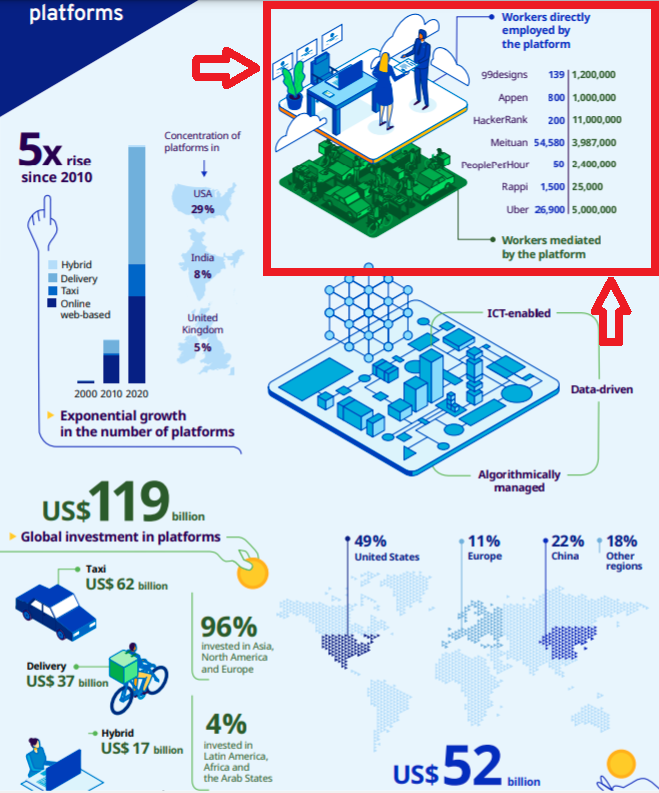The ILO (International Labour Organization) has published a ‘flagship’ report about the platform economy. You know, the ‘Deliveroo‘, ‘AirBnB‘, ‘Uber‘ and ‘Mechanical Turk‘ economy. This economy is rapidly growing and is already changing our way of life – and work. I’m not going to parse the report (the ‘executive summary’ is 10 pages for a reason) but I will investigate if the platform economy is a new ‘mode of production’. The first question is how to define a ‘Mode of Production’. Let’s be inspired by Engels and Marx: for living, breathing, procreating people, a Mode of Production is “a definite form of expressing their life … What they are, therefore, coincides with their production, both with what they produce and how they produce“. So, does the platform economy change
Topics:
Merijn T. Knibbe considers the following as important: Uncategorized
This could be interesting, too:
tom writes The Ukraine war and Europe’s deepening march of folly
Stavros Mavroudeas writes CfP of Marxist Macroeconomic Modelling workgroup – 18th WAPE Forum, Istanbul August 6-8, 2025
Lars Pålsson Syll writes The pretence-of-knowledge syndrome
Dean Baker writes Crypto and Donald Trump’s strategic baseball card reserve
The ILO (International Labour Organization) has published a ‘flagship’ report about the platform economy. You know, the ‘Deliveroo‘, ‘AirBnB‘, ‘Uber‘ and ‘Mechanical Turk‘ economy. This economy is rapidly growing and is already changing our way of life – and work. I’m not going to parse the report (the ‘executive summary’ is 10 pages for a reason) but I will investigate if the platform economy is a new ‘mode of production’.

The first question is how to define a ‘Mode of Production’. Let’s be inspired by Engels and Marx: for living, breathing, procreating people, a Mode of Production is “a definite form of expressing their life … What they are, therefore, coincides with their production, both with what they produce and how they produce“. So, does the platform economy change what people produce and how they produce, ‘how’ including social and economic relations and legal and power structures? I’ll focus on 4 classes: I – the entrepreneurs/owners, II – the providers of capital, III- employees, IV – the workers including, in the case of Airbnb the owners of houses, in the case of Uber the owners of cars and vans and in the case of Mechanical Turk the owners of – labor. About the entrepreneurs/owners: these people do not want to sell a product or a service. They want to provide, and own, the market. The market: the place were sellers and buyers meet and haggle and make transactions and which consists of habits, culture, physical of digital places and laws. They do not want the monopolize supply. They want to be the only option for selling or buying specific products or services. Which will enable them to charge buyers as well as sellers for the right to buy or sell. On top of this, some of these platforms use algorithms which set prices which have to be accepted by sellers and buyers alike. And charge sellers and buyers for accepting these prices. They surely want to change the way people work.
This sure seems like a new way of providing products and services or, to state it that way, a new ‘mode of production’ and this even more so surely as an entity which owns the market itself can also restrict access to the market. Interestingly, the number of official employees of companies like Uber is pretty small, which also indicates that the modes of production are changing. If you indeed succeed in owning the market, untold riches are up for grabs. Which explains why group II, the people and institutions providing money, is willing to fund enormous losses. Group III has almost become an afterthought (even when a juridical battle is going on when it comes to defining the labor relations between platforms and their workers these employ). See also the ILO report about the way of living and the characteristics of the platform workers.

The report also contains information on business to business relations, regulation and social action. It’s not all bleak and it does give possibilities. But about group IV:: “Algorithmic management is defining the everyday work experience, performance and achievement for workers using the data generated by workers while working on the platform“. Computers are totally able to analyze your keystrokes, the way you drive and whatever. And much more: “Autonomy and control over work is limited for workers in the app-based taxi and delivery sectors. A key facet of autonomy and control over work is related to their ability to choose working hours and break times, as well as to decline certain orders, for reasons such as exhaustion or safety concerns. Their schedules and destinations can, however, be shaped by their ratings and “levels”, as well as by other incentive structures of the platforms such as surge pricing. A sizeable proportion of workers in the app-based taxi (37 per cent) and delivery (48 per cent) sectors are unable to refuse or cancel work, as such refusal or cancellation is likely to have negative implications for their ratings“. The owner of the market will have your cake and eat it…
